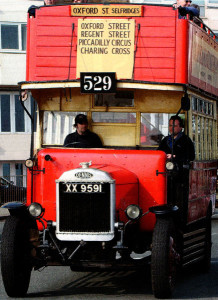
My father was a tram driver for Birmingham Corporation Transport in the mid 20s. The depot was on the same road as his lodgings. If he was late his conductor would drive the tram down to the house, clang the bell, and turn it round. Father would leap aboard and take over.
It was shift work and on one occasion he returned to empty lodgings, put a match to the fire, and nipped out for a paper. On his return he thought the fire was burning well and settled down to read the paper. Sounds of someone preparing an evening meal began to drift along the corridor. Looking around for his slippers father began to feel uneasy. The furniture, the wallpaper and the curtains were different. He was in the wrong house. He left, very quietly closing the door.
In the late 20s he moved to buses working from Acocks Green. One regular route was the 29A, Gospel Lane to Kingstanding I think. An early memory is walking with mother to intercept him at Pemberley Road bus stop with a flask of tea and sandwiches.
This time it was snowing hard and the only protection for the driver was a sloping tarpaulin apron stretched between the bonnet and the small canopy. All I could see of him was his goggles, which he was constantly wiping. His peaked cap, his face and scarf were all thick with snow – but the snow on his face cracked into a grin at the sight of us and his warming flask.
We children looked forward to the Christmas party and pantomime hosted by one of the depots. If it was to be Harborne, Cotteridge or Perry Barr we were bussed there from Acocks Green for a slap up tea with jelly, cakes and trifle. We then filed past Father Christmas for a gift. Meanwhile the seating was rearranged for a first rate panto with bags of “He’s behind you!” and “Oh no he isn’t!”
Another regular treat was the summer sports day, again with a great tea. One year after watching ‘Blondin’, a high wire performer, a mate and 1 found the boxing ring. A barker was inviting lads to entertain onlookers with a display of the ‘noble art’. We’d been a bit snarly with each other, so put the gloves on. After flailing around inexpertly for three short rounds, the ref announced a draw and we were best mates again.
Father was in the Transport and General Workers Union at the time of Oswald Mosely and his blackshirts. Once, father overtook one of their marching bands on Stratford Road and drove very slowly ahead of them while moving the ignition advance and retard lever up and down causing continuous loud backfiring. He kept this up for quite a distance.
He felt that the T&GWU wasn’t doing enough for the rank and file and gathered a number of like-minded members forming them into a sub-branch to influence Union policy. They were not successful. Communists said they were fascists and fascists said they were communists. One day a letter arrived from Ernest Bevin threatening to expel father and the others from the union. Their efforts fizzled out.
Sometime in 1936 a tram ran into the back of Dad’s bus while he was loading passengers. The whiplash caused his head to hit a metal stud behind him. The next thing he was walking into Steelhouse Lodge police station and asking them who he was. Following treatment and a medical, he was pensioned off early.
He then drove for a transport firm called A.J. Gupwell in Bradford Street, a long-distance job that meant leaving Birmingham around midnight and bringing a load back the following night.
Some of the lodgings were a bit iffy, not every host being fussy about changing bedsheets, so sometimes he slept in the cinema, or if the weather was good, the park.
Two stories stick in my mind. The first was an early hours trip when his six-wheeler skidded outside a grocery shop, upending a street lamp and fracturing its gas pipe. I*–. k He banged on the shop door. An upstairs window opened.
“Waddya want?” came a grumpy voice.
“A bar of Sunlight soap.” There was brief silence: “Well you can ‘blankety blank’ wait until I’m open at eight o’clock.”
“OK,” said father “but in the meantime your shop might blow up…”
When the grocer realised what had happened he quickly produced the soap and father rammed it hard into the broken pipe. He left the grocer to call the gas board and continued on his way.
On another occasion his Pierce Arrow lost power and he heard the clonking of a stripped big-end bearing. He carefully drained and saved the engine oil, removed the sump and dismantled the big-end. He then shaped a workable bearing from his leather belt, re-fitted it and drove home.
Bob Aldridge








